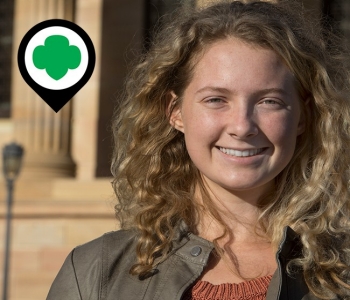Meet Hannah G: She Puts the Risk-Taker in G.I.R.L.

The young women featured in this series have not only earned Girl Scouts’ highest honor by being named 2016 National Young Women of Distinction—they also serve as incredible examples of what it means to be a G.I.R.L. (Go-getter, Innovator, Risk-taker, Leader)™.
Four years ago, my uncle died of a heroin overdose. I didn’t know much about drugs when he died—and I definitely didn’t know the effects addiction, overdose, or drug abuse were having in our communities. At school, our teachers would talk a little bit about marijuana and alcohol, just telling us not to use them, but that was pretty much it. I didn’t even know what heroin was! It simply wasn’t something anyone talked about. In fact, it was something people wanted to keep so quiet about that after my uncle’s death, my grandparents didn’t even want to publish an obituary in the local paper.
I started looking into the issues of drug abuse and addiction and realized that we have a huge problem with heroin and prescription painkiller abuse where I live in eastern Kentucky—and because nobody was speaking up about it, it was just getting worse. And as a Girl Scout, I’ve always been taught to speak up about the important things nobody else is taking a stand for—so it made sense to me to focus on raising awareness about drug abuse and addiction for my Girl Scout Gold Award project.
At school, we have Suicide Prevention Day, on which all of the students are shown a film about depression and other issues that contribute to suicide, and it’s gotten a lot of good conversations going. People know there are resources available to them if they or someone they care about is in trouble, and I think that’s so important. I wanted to do the same thing regarding drug abuse—to make sure students know who to turn to if they or someone close to them needs help. Too many people, including my uncle, have died from drug abuse. If I could save one life, it would be worth it to me.
So I set out to make a video that could show drug abuse and addiction for what it really is—an illness, not a choice. I wanted to make people see that the people who use drugs aren’t all bad people. My uncle was a good guy—he was a Boy Scout!—but he got caught up in drugs and couldn’t break free of them. If we could get rid of the stigma around drugs and let people know there are resources out there to help them instead of just judge them, I think we’d have a lot fewer deaths from heroin and other dangerous drugs.
I started talking to people in my neighborhood and finally found a videographer who was willing to donate his time to help me make my video. I talked to recovering addicts about what their struggle was like and learned so much through the process. Finally, when my video was done, we had a big premiere at a church in Louisville. Two hundred people from my town came out to watch it, and after, so many of them told me they’d learned something or that my video had really made them think. And the day after, I had a ton of messages on Facebook from people who wanted copies to show to their students or community members.
Now, not even a year later, I have distributed more than 100 DVDs of my video—mostly to middle schools—and visited numerous schools in my state to give talks and screenings, and the video has had more than 5,000 views online. Knowing I’ve reached so many people with my message has been amazing, but the most exciting thing to me is knowing that I’ve changed someone’s mind or let someone know they aren’t alone and don’t have to feel ashamed for having a drug issue in their family. When I go to schools and show my video, kids are almost always shy at first and don’t want to say anything about their own experiences, but after, they come up to me all the time and tell me about how their mom was incarcerated for drug possession or how their dad died from drug abuse.
It’s time we start talking about the real issues that face us all and stand together to help one another, instead of just making people feel bad or suffer in silence. Girl Scouting taught me that when we speak up about something we believe in, we can make a difference—and I hope that my Gold Award project continues to make a difference in my community and even across the country for years to come.





